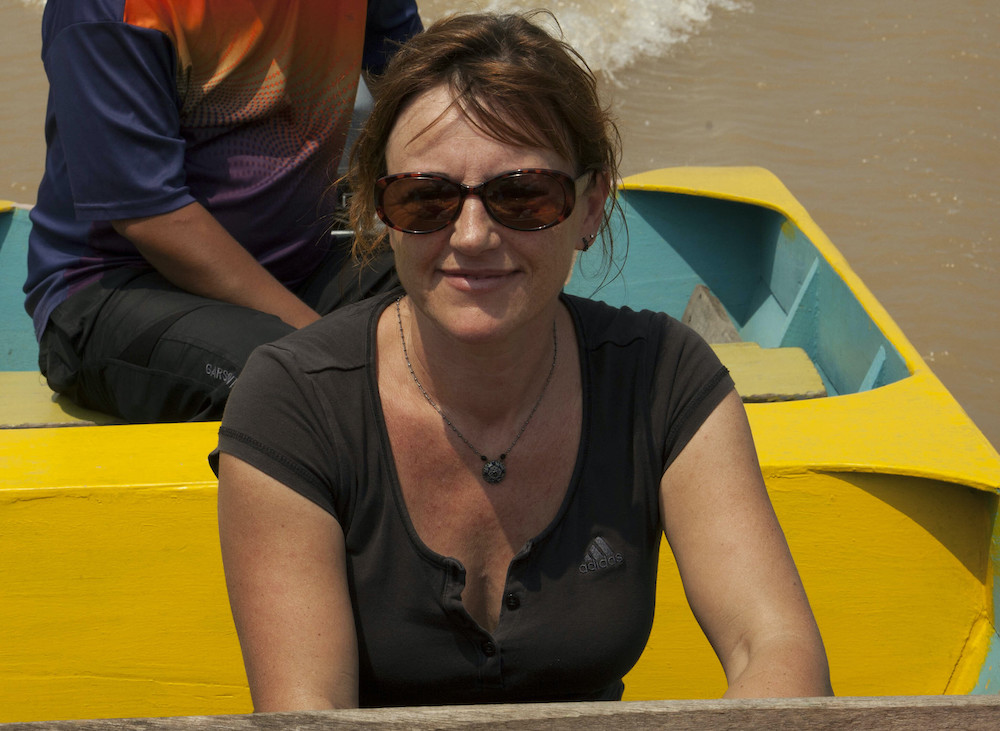The life of Malaysian Borneo called Isabelle Lackman to the island over two decades ago, and there she stayed. Having co-founded WLT partner HUTAN in 1996, the primatologist has witnessed the impact made since on the Kinabatangan forests by the grassroots conservation group she leads: a movement of local people who save crucial orangutan and elephant habitats, and benefit as a result. This is, in Isabelle’s own words, why it is paramount to protect two new properties through our new appeal – the latest chapter of decades restoring a landscape battered by deforestation.
My dream had always been to research the orangutans in Borneo’s rainforests, but when we arrived more than 20 years ago to the village of Sukau we soon realised that conservation issues were too pressing – if we didn’t do something there’d be no orangutans left to study.
I look back at all our conservation work at Kinabatangan since that day and I feel proud of the dedicated team we have built: 70 people, almost all from the village itself, who started with little education but have become expert conservationists. Together, we’ve followed various approaches to reconnect and restore a landscape torn by decades of deforestation. We’ve used land purchases to save the 460-acre Keruak Corridor and enlisted local women to plant 52,415 trees in the Genting Corridor. We’ve combined this with extensive research on orangutans and other species, mediating the creation of smaller corridors within plantations and many others.
With help from WLT’s appeal, HUTAN’s chance to save two new plots of rainforest is critical to reconnect habitat for orangutans, following decades where populations have collapsed by 95% and split into isolated clusters. Credit: HUTAN
Wherever we look, we see signs of how impactful this work has been; how key it is for it to continue. Despite our progress over the years, Kinabatangan remains at breaking point. Logging followed by commercial plantations has created a landscape of small fragments of protected forest – leaving big species with no choice but to cross through private land. From an estimated 20,000 individuals in 1900, the area’s orangutan population has crashed to about 785, split into clusters in isolated forest patches where genetic diversity is at risk. As for Borneo Pygmy Elephants, habitat fragmentation is pushing them to plantations and villages – conflicts, and resulting elephant casualties, are getting worse every year.
This is a future for Kinabatangan that we cannot accept and if you help us, we won’t have to. Having protected the crucial Keruak Corridor in recent years – and seen the difference it has made – a chance exists this year to replicate this success just across the river, at Pangi. This is an area we’ve already been protecting, acre by acre, with help from past WLT appeals and WLT patron Steve Backshall. Now a new opportunity has emerged: two properties that are available for purchase.
Our appeal will fund HUTAN’s planned purchase of two properties – 10 acres in all – connecting the Pangi Virgin Jungle Reserve to the banks of the Kinabatangan River. As the map shows, the two plots will link Pangi to the WLT-backed Keruak Corridor across the river. Credit: WLT.
For proof of how strategic they are, take a look at our map of the area (pictured above). With help from your donations to WLT’s new appeal, the protection of this stretch of land will connect the existing Pangi Virgin Jungle Reserve to the river, a safe passageway for elephants to swim across. It will cordon off a significant and as of yet unprotected expanse of rainforest along the river bend, making its conversion to crops less likely. It will safeguard river banks Indigenous people rely on for sustainable prawn fishing.
Habitat fragmentation is pushing the Kinabatangan‘s elephants into private land and conflict with humans, but HUTAN’s plan would secure a safe passage for these gentle giants to reach the river and swim across. Credit: HUTAN
Land protection in a place like Malaysian Borneo can be costly but the high price tag also reflects the astonishing biodiversity here, among the highest on Earth. The size of the properties we can secure – 10 acres across the two – might not sound like much, but the life they pack is spectacular; and every acre counts. Orangutans and elephants aside, these rainforests are home to the critically endangered Sunda Pangolin, 10 primate species, 314 bird species (including eight hornbill species), Sunda Clouded Leopard, Malay Sun Bear and many more.
Looking at today’s world, a planet where nature is increasingly fragmented, it’s easy to wonder whether coexistence is possible. If there’s a legacy for HUTAN after decades of work, I believe it’s this: having shown that all sides – wildlife, the local economy, Indigenous people – can thrive together when conservation is inclusive. That is our vision, and that is what we can continue to deliver at Pangi this year, with your help.
A better future is possible for the rainforests of the Kinabatangan Floodplain. Let’s create it together!
Isabelle Lackman
Director of HUTAN

